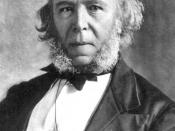Government, business, economics, the family, education, culture, health care, communications, environmental concerns, professional entertainment are among the social elements that determine the course of human society, the civilization in which we live. Each of these components of society is continuously evolving; and as knowledge accumulates these, changes occur at an accelerated rate. Meaning, there were more social changes in the 20th Century than there were in the 19th. This concept known as social evolution has been studied for hundreds of years and is prevalent throughout the works of many famous theorists including: Comte, Spencer and Durkheim.
Comte's ideas about social evolution were outlined in his law of three stages. Comte believed that the human mind, human's physical being, branches of knowledge, and the history of the world, all go through these three stages. (Ritzer, 2000. P. 90) The first of these three stages is the theological stage. In this stage one is attempting to figure out his or her purpose in life.
It is the search for absolute knowledge, asking oneself "where did I come from and why am I here?" In this stage it is concluded "that all phenomena are created, regulated, and given their purposes by supernatural forces or beings (gods)."
The second stage is the metaphysical stage. In this stage abstract forces replace supernatural beings. These abstract forces can be used to explain the unknown. Examples of such forces are nature, or, to borrow a term from Durkhiem, the collective conscience of a group (example- group mob mentality). The was the least important stage to Comte, and is simply a transition stage because Comte thought that to go from the first to third stage directly was too drastic of a change.
The third and final stage is the Positivist stage. It is in this...


